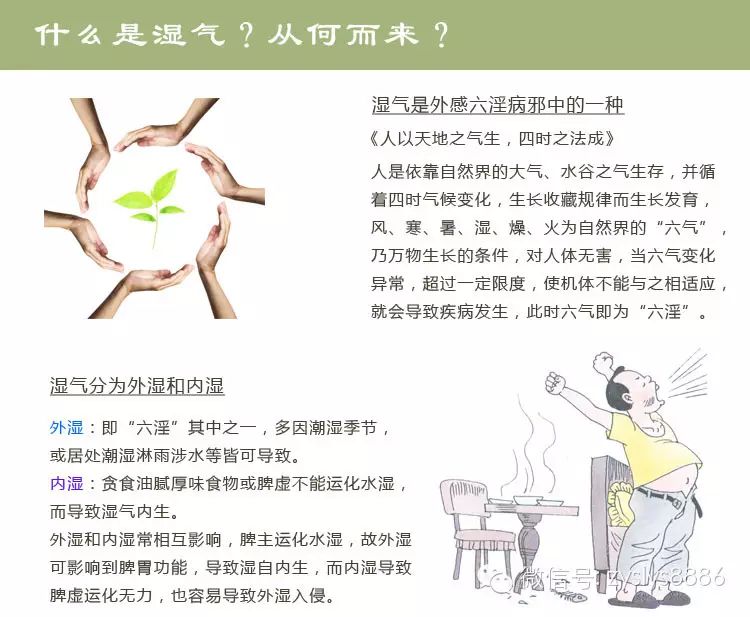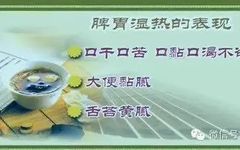Irregular eating habits, a preference for sweet and greasy foods, and exposure to dampness can all lead to pí wèi shī rè (Spleen and Stomach Damp-Heat). So, what exactly is Spleen and Stomach Damp-Heat? What are the symptoms associated with it?
Symptoms of Spleen and Stomach Damp-Heat
Generally, if the body is experiencing Spleen and Stomach Damp-Heat, the mouth may feel bitter, and there may be increased thirst, yet a lack of desire to drink water. The color of urine may change, and constipation may occur. The specific symptoms are as follows:
1. Dry mouth and tongue, with a bitter taste, yet no desire to drink water. The mouth feels sticky, and consuming sweet foods may lead to acid reflux and nausea;
2. Fatigue and a feeling of weakness in the limbs;
3. Yellow urine and difficulty with bowel movements, potentially leading to constipation;
4. A yellow and greasy tongue coating, with a slippery and rapid pulse;
5. A sensation of heat and soreness in the body.
 Differentiation of Spleen and Stomach Damp-Heat
Differentiation of Spleen and Stomach Damp-Heat
Although Spleen and Stomach Damp-Heat is a condition, it can be categorized into several types, generally divided into shī rè zhèng (Damp-Heat Syndrome) and hán shī zhèng (Cold-Damp Syndrome). The specific differentiation methods and symptoms are as follows:
Cold-Damp Syndrome: At this time, the body may feel nauseous and want to vomit, accompanied by fatigue and loose stools. There may also be cold pain in the waist and limbs, and the abdomen may feel cold, especially worsening in lower temperatures or humid conditions, potentially leading to persistent dull pain, which is more severe at night.
Damp-Heat Syndrome: The mouth feels bitter, dry, and sticky, with a lack of desire to drink water. The face and lips may appear red, and there may be sores in the mouth and tongue. Additionally, the body may feel hot, especially in the afternoon, and there may be headaches and a heavy sensation in the body. In terms of diet, there is a lack of appetite, a dislike for greasy foods, and a frequent feeling of fullness and abdominal pain. Vision may also be affected, with a cloudy cornea, and the tongue coating may become yellow and greasy, with a red tongue body.
Prevention of Spleen and Stomach Damp-Heat
Experts tell us that there are many reasons for the occurrence of Spleen and Stomach Damp-Heat. Besides the initial disease not being effectively treated, it is also related to poor lifestyle habits. Therefore, to restore health, it is essential to pay special attention to diet, avoiding greasy and spicy foods, and particularly quitting smoking and drinking to better protect the Spleen and Stomach.
Additionally, when regulating the Spleen and Stomach, it is also necessary to promote lung qi to fundamentally resolve the Damp-Heat condition. This is because the Spleen primarily manages the transformation of food and fluids, while the lungs are responsible for dispersing essence. Therefore, the regulation of the Spleen and Stomach requires assistance from the lungs to ensure that fluids are distributed throughout the body. The Spleen manages the ascending of clear and descending of turbid, while the lungs are responsible for dispersing. Thus, when treating and regulating the Spleen and Stomach, one must not forget to regulate the lungs. In the commonly used prescriptions for treating Spleen and Stomach Damp-Heat or foods for Spleen and Stomach health, it is essential to include herbs that have the function of promoting lung function and relieving depression, such as xìng rén (Apricot Kernel) and má huáng (Ephedra).
 If symptoms of Spleen and Stomach Damp-Heat occur, it is crucial to persist in clearing heat and draining dampness to restore health effectively. One can choose to take San Ren Tang (Three Nut Decoction) for treatment, while also adjusting the herbs based on specific conditions. Commonly added herbs include dōng guā pí (Winter Melon Peel) and yīn chén (Virgate Wormwood), both of which have effects of dispelling dampness and clearing heat. If there is damp-heat diarrhea, it is best to add gé gēn (Kudzu Root) and cén lián (Coptis) for optimal results. If Spleen and Stomach Damp-Heat is accompanied by jaundice, one should choose wǔ líng sǎn (Five-Ingredient Powder) or yīn chén (Virgate Wormwood) for targeted treatment.
If symptoms of Spleen and Stomach Damp-Heat occur, it is crucial to persist in clearing heat and draining dampness to restore health effectively. One can choose to take San Ren Tang (Three Nut Decoction) for treatment, while also adjusting the herbs based on specific conditions. Commonly added herbs include dōng guā pí (Winter Melon Peel) and yīn chén (Virgate Wormwood), both of which have effects of dispelling dampness and clearing heat. If there is damp-heat diarrhea, it is best to add gé gēn (Kudzu Root) and cén lián (Coptis) for optimal results. If Spleen and Stomach Damp-Heat is accompanied by jaundice, one should choose wǔ líng sǎn (Five-Ingredient Powder) or yīn chén (Virgate Wormwood) for targeted treatment.
Generally, the most common treatment for Spleen and Stomach Damp-Heat is wēn dǎn tāng (Warm Gallbladder Decoction), which consists of fú líng (Poria), chén pí (Aged Tangerine Peel), zhú rú (Bamboo Shavings), bàn xià (Pinellia), zhì gān cǎo (Honey-Fried Licorice), dà zǎo (Jujube), zhǐ shí (Bitter Orange), and shēng jiāng (Fresh Ginger) boiled together. This decoction effectively treats Spleen and Stomach Damp-Heat, palpitations, insomnia, and weakness after a major illness. Since the herbs used are generally of a warm and cooling nature, adjustments should be made based on different conditions during clinical use.
Suggestions from the Editor
Spleen and Stomach Damp-Heat can cause significant harm to the body, so it is essential to understand its symptoms and apply appropriate treatments. Additionally, one should cultivate good lifestyle habits, as smoking and drinking are not beneficial habits and should be avoided. Furthermore, daily meals should be kept light, minimizing spicy and greasy foods.
| TCM Dietary Therapy|
The best doctor is yourself, the best hospital is your kitchen.
The best medicine is food, and the best effect is persistence.


